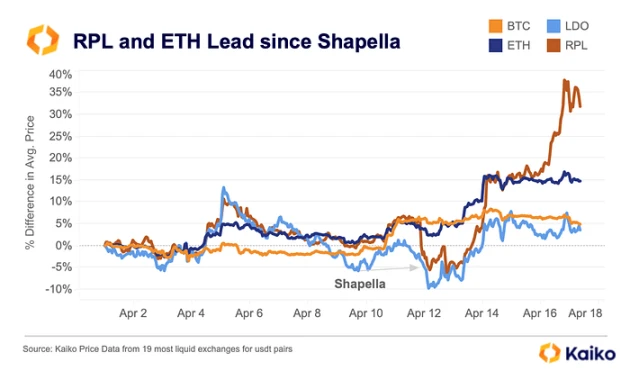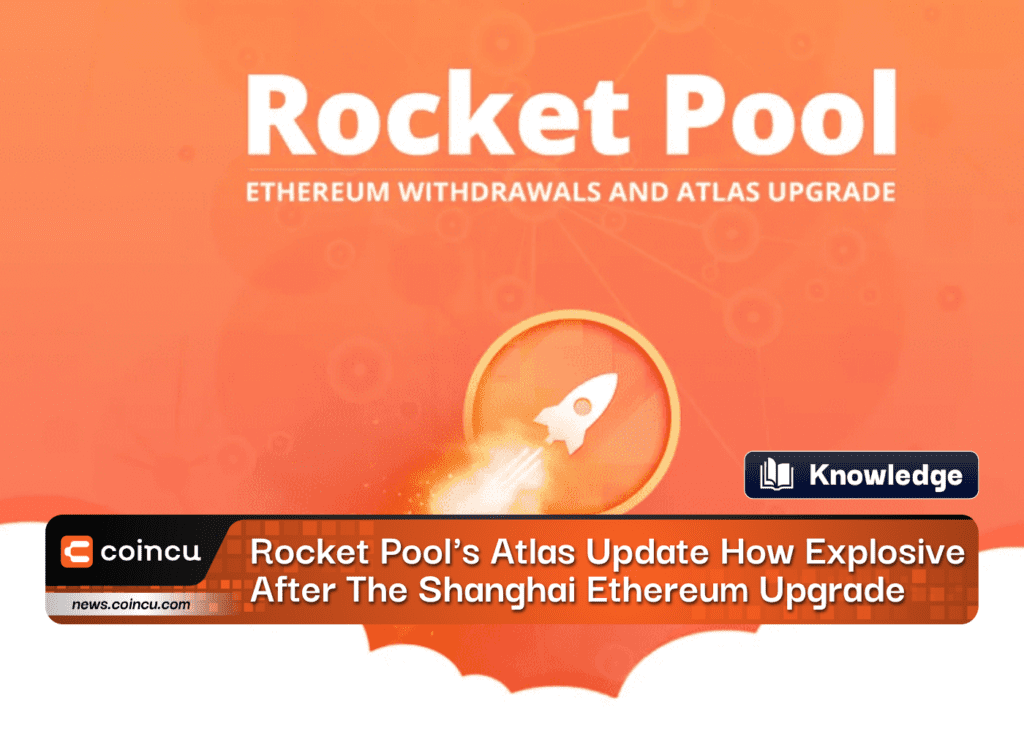Atlas, Rocket Pool’s second major upgrade since the mainnet launch has been successfully launched. To increase compatibility with the Ethereum Shanghai (Shapella) update, the update brings the protocol including updates to both the Smartnode stack and the Rocket Pool protocol in general.
Rocket Pool shines ahead of Atlas update
Since the Shapella update, Rocketpool (RPL) has not only significantly outperformed BTC and ETH, but also outperformed its closest competitor and market leader in terms of liquidity staking protocol, Lido ( LDO). Rocketpool is currently relatively small in the Ethereum staking industry, with just 2% of the depositors market share, compared to Lido’s 31% and Coinbase’s 12%.

However, since Shapella, RPL has increased by almost 40% thanks to potentially bullish catalysts. Rocketpool also got its own update this week, Atlas, which will reduce the amount of ETH needed to become a validator of the protocol from 16 ETH to 8 ETH. It usually takes 32 ETH to become a validator on the Ethereum network, so this upgrade will give Rocketpool a competitive edge over other protocols in the form of more validators and a more decentralized network, could also allow it to gain market share.
Outstanding changes
For Shapella and withdraw
Shapella introduces withdrawals to the Beacon Chain, meaning node operators can now access the ETH currently locked on the Beacon Chain in 2 options:
- Partial Withdrawal (Skimming), where your reward (your excess Beacon Chain balance over 32 ETH) is sent to your minipool on the Execution Layer. This is done automatically by the protocol itself regularly (about every four or five days on the Mainnet).
- Full Withdraw, when you exit your validator from the Beacon Chain and its entire balance is sent to your small pool on the Execution Layer. This is done automatically by the protocol itself after your validator has been off the chain for long enough.
Atlas introduces a new authorization contract for small pools that allows node operators to distribute the small pool’s ETH balance, split equally between the node operator and rETH holders (plus commissions, of course) anytime. This gives node operators instant access to their Beacon Chain rewards! It also returns rETH holders’ share back to the deposit pool, so it can be used to free rETH for ETH at the protocol’s exchange rate (or to create new shards).
ETH Optimized Minipool
One of the most anticipated changes made in Atlas is the introduction of the ability to only provide 8 ETH to create a minipool instead of 16 ETH. Minipools with only 8 ETH linked by their owning node operator are matched against 24 ETH from the staking pool (provided by rETH holders) to generate validators. This greatly reduces the capital requirement to run your own validators and provides higher returns for both node operators and rETH bettors! In fact, running two 8 ETH minipools instead of one 16 ETH minipool will yield 18% more rewards – even if the 16 ETH minipool has a commission rate of 20%.
New minipools can be created with 8 ETH or 16 ETH. Minipool 16 ETH is unchanged from how they work today and is available to users who want to minimize their exposure to RPL tokens.
Additionally, once Atlas has been applied, node operators can directly migrate existing 16 ETH minipools to 8 ETH minipool without having to exit. This will return them 8 ETH as deposit credit, which can be used to create a new 8 ETH minipool for free.
There are also many other improvements such as the efficiency of using Minipool gas. Make a new Minipool post, Atlas will now use 40% less gasoline.
Solo Staker Migration
Part of the Shapella upgrade involves the ability for a single validator to change their validator’s withdrawal information (opens a new window) from the original BLS-based withdrawal key (currently unused) application to an address on the Execution class. This address will be the recipient of all that validator rewards and all ETH balances after exiting the Beacon Chain.
Currently about 30% of validators on Ethereum are classified as unknown, this means we don’t know whom they staked from. Generally it’s safe to say most of these are solo stakers which is awesome for Ethereum’s health.
With withdrawals rapidly approaching, node operators who are staking can now withdraw their ETH. With Rocket Pool being the only current permissionless protocol for node operators to join, we’ve designed a method for these node operators to migrate to Rocket Pool should they wish to do so, while still maintaining the decentralisation factor.
Regular Rocket Pool node operators need not worry about any of these issues, as the protocol automatically sets this up for your small pools as you create them. However, as part of this new requirement for single validators, Atlas presents an interesting opportunity: the ability to create a special minipool that will become the withdrawal address for existing single validators.
In other words, this will allow you to convert a solo validator directly into a Rocket Pool minipool without having to exit it.
New Smartnode feature
Starting with Atlas, node has a new mission: automatically distribute minipool rewards! This is because of how the Shapella upgrade works, by transferring your rewards from the Beacon Chain into your minipool every few days.
In addition, created a new Grafana dashboard (opens a new window) to help node operators monitor and evaluate the status, progress, and overall health of their nodes.
Smartnode v1.9.0 also introduces split mode support to Nimbus! Instead of running Beacon Node Client and Validator inside a single process/container, Smartnode will now run them in separate containers just like other clients.
Conclusion
This upgrade will be Rocket Pools biggest to date and will be focused at scaling the protocol to meet much higher demand, now and into the future, while fully maintaining our commitment to decentralisation and the health of the Ethereum.
One of the most important changes made as a result of the Atlas upgrade is actually supporting Shapella’s cons, allowing anyone to reverse their ether (ETH) bets coming from the Rocket Pool system completely. perfect. This will certainly enhance the flexibility of the system, making it a lot simpler and also available to a more comprehensive viewer.
Overall, the Atlas upgrade will improve ease of access, flexibility, and safety. Therefore, it is really no surprise that the market has actually reacted favorably to this advance, increasing the RPL ratio.
It will certainly be of interest to how the Rocket Pool system continues to grow and evolve in the coming months and years as it seeks to dethrone the leading decentralized betting system in the Ethereum community.
DISCLAIMER: The Information on this website is provided as general market commentary and does not constitute investment advice. We encourage you to do your own research before investing.
Join us to keep track of news: https://linktr.ee/coincu
Foxy
Coincu News





